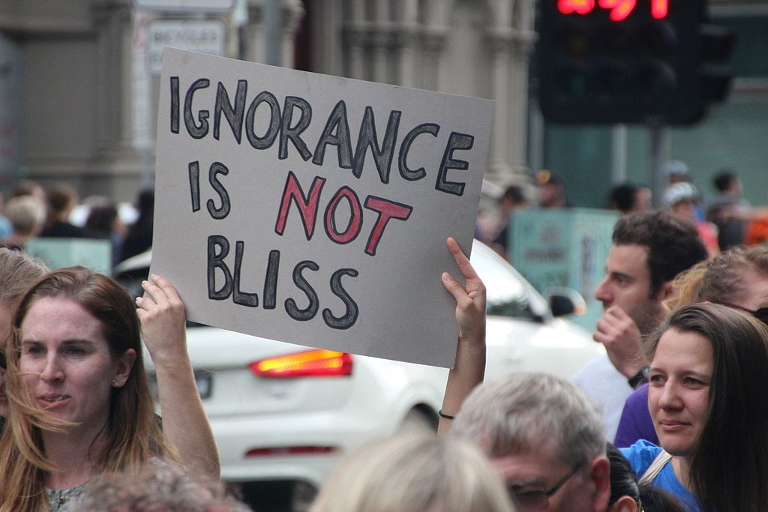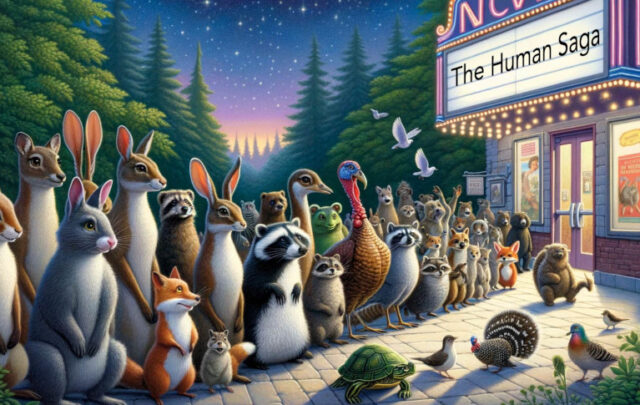On my arrival in the United States I was surprised to find so much distinguished talent among the subjects, and so little among the heads of the Government.” Alexis de Tocqueville, 1835.
We may fairly assume that Tocqueville, the famous French historian, would be even more surprised if he were to visit America today. The 45th President, Donald Trump, has made no secret of his disdain for learning and specialized knowledge, sneering at a campaign rally in 2016, “You know, I’ve always wanted to say this—I’ve never said this before with all the talking we all do, all of these experts, ‘Oh we need an expert’—the experts are terrible!”
Such comments provide ample fodder for Tom Nichols’ topical and engaging new book, The Death of Expertise. For Nichols, the anti-intellectual strain in the U.S. has transmuted into an arrogant contempt for intellectual authority due to major shifts in education, journalism, and the media and political environments. Taken together, he claims, these shifts have driven American democracy to the brink of authoritarian populism.
A professor of national security affairs at the U.S. Naval War College and a former political adviser, Nichols argues that the country has shifted from a healthy skepticism of accepted knowledge to a proud, self-satisfied ignorance and active hostility to the very idea of expertise. Across American society, intellectual authority is resented, resisted and disregarded, with every opinion ostensibly holding equal weight.
This leveling of viewpoints has been accelerated by digital technologies and platforms, which have further lowered the barriers to participation, opening the floodgates to those without the requisite educational backgrounds and professional credentials. As Nichols puts it:
“I fear we are witnessing […] a Google-fueled, Wikipedia-based, blog-sodden collapse of any division between professionals and laypeople, students and teachers, knowers and wonderers—in other words, between those of any achievement in an area and those with none at all.”
In the absence of these crucial distinctions, Nichols asserts, public discourse has become degraded by unquestioned cognitive biases and a dearth of informed, evidence-based argumentation.
Referencing recent commentaries such as Susan Jacoby’s “The Dumbing of America,” Nichols vividly sketches the denigration of expertise in key areas of society. Institutions of higher education have lowered their standards, providing affirmative “safe spaces” rather than necessarily uncomfortable intellectual challenges. No longer a time of disciplined learning and personal growth, college has become what Nichols describes as “a consumer-oriented experience in which students learn, above all else, that the customer is always right.”
Consumer rankings and ratings are also ubiquitous in cyberspace, where every buyer is now a critic and an opinion maker on websites like Amazon and Yelp. Drowning out expert perspectives, the Internet offers quick facts and views without the guarantee of accuracy, consistency, or disinterested, non-partisan oversight. Finally, contemporary journalism has adopted an open-ended and participatory format that caters primarily to customer interests, blends news with punditry and entertainment, and perpetuates both ideological segregation and distrust in government, the media, and other democratic institutions.
In addressing the depreciation of established knowledge, The Death of Expertise joins a tradition of writing that extends back to Richard Hofstadter’s Pulitzer Prize-winning Anti-intellectualism in American Life, published in 1963. Yet Nichols’ analysis fails to assimilate Hofstadter’s account of the “cyclical fluctuations” of anti-intellectualism that have rippled across all spheres of U.S. society for centuries, often rising in periods of complex and bewildering global change. On what basis, then, can one contend that American anti-intellectualism has become more pervasive over the past half-century and is now, in Jacoby’s words, “less a cycle than a flood”?
Positing a qualitative shift, Nichols often makes recourse to lapsarian, technological-determinist arguments that attribute the decline of critical intelligence in large measure to digital culture. Ironically, such claims reactivate familiar tropes in the history of media, issuing pessimistic diagnoses of mass manipulation and stupefaction that can be traced back to previous historical junctures, when older technologies were likewise new. Writing after the first televised presidential debates in 1960, Hofstadter himself noted that twentieth-century politics had been shaped by “the American mania for publicity and the development of the mass media.”
At the same time, Nichols misses a crucial opportunity to revisit Hofstadter’s work in light of the economic and social transformations of the past half-century. Noting the ubiquity of the business paradigm in American culture, Hofstadter wrote:
“Business not only appealed to vigorous and ambitious men but set the dominant standards for the rest of society, so that members of the professions—law, medicine, schoolteaching, even the ministry—aped businessmen and adapted the standards of their own crafts to those of business.”
The hegemony of business logic has significantly expanded over the last three decades, as Wendy Brown argues in Undoing the Demos. Neoliberal rationality has subjected all spheres of human existence to economic metrics, such that even non-monetized domains of action are now framed and measured according to a market model. Privatizing public goods and thinking only in terms of capital enhancement, neoliberalism has undermined the necessary conditions of democratic citizenship, leading to a situation in which, as Brown writes:
“politics [is] peculiarly unappealing and toxic—full of ranting and posturing, emptied of intellectual seriousness, pandering to an uneducated and manipulable electorate and a celebrity-and-scandal-hungry corporate media.”
Insofar as Brown contends that “smugness in ignorance” has supplanted a Socratic sense of humility, she shares Nichols’ view of contemporary American political discourse. Yet whereas she stresses the ominous threat posed to democracy by neoliberal capitalism, Nichols sees the nation’s fate hinging on individual action:
“There is plenty of blame to go around for the parlous state of the role of expertise in American life […]. Experts themselves, as well as educators, journalists, corporate entertainment media, and others have all played their part. In the end, however, there is only one group of people who must bear the ultimate responsibility for this current state of affairs, and only they can change any of it: the citizens.”
While this behaviorist approach prompts readers to contemplate what actions are within their immediate control, it remains fixed on the level of cultural symptoms or epiphenomena, without regard for pathologies or underlying forces.
In a troubling passage from the Introduction to The Death of Expertise, Nichols reflects on the massive social transformations since the 1960s:
“Social changes only in the past half century finally broke down old barriers of race, class, and sex not only between Americans in general but also between uneducated citizens and elite experts in particular. A wider circle of debate meant more knowledge but more social friction. Universal education, the greater empowerment of women and minorities, the growth of a middle class, and increased social mobility all threw a minority of experts and the majority of citizens into direct contact, after nearly two centuries in which they rarely had to interact with each other. And yet the result has not been a greater respect for knowledge, but the growth of an irrational conviction among Americans that everyone is as smart as everyone else.”
Filled with ambivalence, Nichols thus recognizes the crucial significance of expanding access to education and widening the parameters of participation in the American public sphere, even as he links advances in sociopolitical equality with the rise of epistemological relativism such that expert knowledge is no longer revered.
Identifying the Vietnam War and Watergate as key causes of declining trust in political elites and institutions, Nichols fails to mention the longstanding abuses of expert truth-claims such as scientific racism and sexism, as well as subsequent efforts to challenge, redefine, and broaden the figure of the ‘expert’—who historically was assumed to be both white and male. Moreover, in citing “increased social mobility” as a contributing factor, Nichols obscures the conservative measures of recent decades that have restricted, and even reversed, democratizing reforms, attacking the diversified middle class and contributing to our present situation of economic polarization and intensified social inequality.
Not only has the dismantling of the American welfare state perpetuated disenfranchisement and increased wealth disparities along racial lines; the liberal arts curriculum has come to be seen as antiquated amidst the utilitarian, market-driven regime of neoliberalism. If, as Nichols correctly argues, college is now perceived as a commodity—with students treated as clients and instructors regarded as service providers who are evaluated based on customer satisfaction—this has emerged in tandem with the precarization of teaching positions and the implementation of corporate logic, personnel and funding models in institutions of higher education—with Trump University as the reductio ad absurdum.
Exacerbating these trends, the President and his administration have proposed unconscionable budget cuts to educational programs, financial aid initiatives, and medical and scientific research, seeking to restructure the entire system with an eye to school choice and privatization. Though Nichols’ book is an important plea for renewing our intellectual climate, it neglects the material bases of education and informed, functional citizenship—as well as the inextricable linkages between economic forces, knowledge production, and social justice.
Teaser photo credit: March for science in Melbourne, Australia on Earth Day, April 22 2017. Credit: By Takver from Australia, CC BY-SA 2.0 via Wikimedia Commons.





